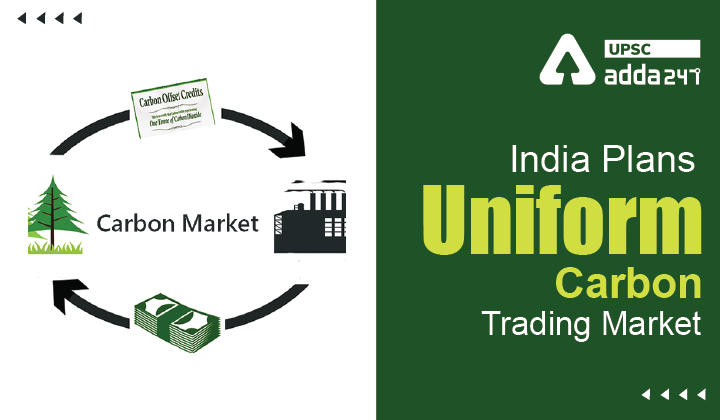Table of Contents
Uniform Carbon Trading Market UPSC: Relevance
- GS 3: Conservation, environmental pollution and degradation, environmental impact assessment.
Carbon trading UPSC: Context
- Recently, India has proposed to have its own uniform carbon market in one year as a large finance avenue for energy transition projects and emission reduction.
Uniform Carbon Trading Market: Key points
- According to a report released by Deloitte Economics Institute, India could gain $11 trillion over 50 years by limiting rising global temperatures and realising its potential to ‘export decarbonisation’ to the world.
- The union government is considering a change in legislation for implementing the carbon trading scheme that will subsume all such present tradeable certificates.
- The government has also proposed to have a closed market that doesn’t allow export of such clean certificates in international carbon markets.
- The government proposes to begin with a voluntary market considering net-zero announcements made by large corporates
- A gradual shift to ‘cap and trade’, where industries are given emission targets like in EU emission trading system markets is proposed.
Uniform Carbon Trading Market: Why needed?
- The present schemes are very limited as buyers are very limited.
- Once formal carbon trading market is opened, and we would have the conversion factor of every such certificate into how much CO2 has been avoided, the market will be very large.
- The market-determined price would reflect the true picture.
- The market will let green plants and energy efficient units estimate earnings through carbon trade, which will help boost and finance more such projects.
Carbon trading in India
- At present, there are two mechanisms of carbon trading
- Perform, Trade and Achieve scheme: Under this scheme, Energy Saving Certificates (ESCerts) are traded.
- The trade of ESCerts has been halted due to poor demand.
- Currently, the scheme covers 11 industries that account for nearly 50% of industrial energy consumption.
- Industries demanded expansion of the scheme to cover more businesses like transport and logistics and raising of penalties.
- Renewable Energy Certificates (RECs): Renewable Energy Certificate (REC) mechanism is a market-based instrument to promote renewable energy and facilitate compliance of renewable purchase obligations (RPO).
- It is aimed at addressing the mismatch between availability of RE resources in state and the requirement of the obligated entities to meet the renewable purchase obligation (RPO).
- One Renewable Energy Certificate (REC) is treated as equivalent to 1 MWh.
Read current affairs for UPSC





 TSPSC Group 1 Question Paper 2024, Downl...
TSPSC Group 1 Question Paper 2024, Downl...
 TSPSC Group 1 Answer key 2024 Out, Downl...
TSPSC Group 1 Answer key 2024 Out, Downl...
 UPSC Prelims 2024 Question Paper, Downlo...
UPSC Prelims 2024 Question Paper, Downlo...




